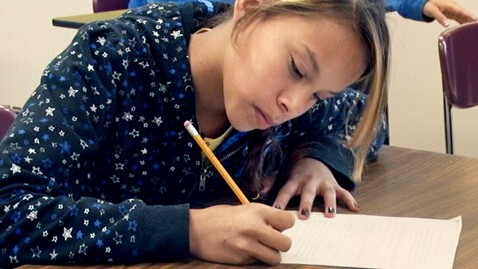Lakota Sioux Girl ‘Stands Against the Wind’
Thirteen-year-old Louise Clifford savors riding her horse, Glory Bee, up in the hills of the Pine Ridge Reservation. It’s a spiritual connection to a land she loves.
“Everything is sacred. The sage, the sweet grass, the dancing, the tipis, the horses, the buffalo. Everything just gets to me because it’s strong and in my blood,” Louise says of the Lakota traditions and rituals that unite her to ancestors that thrived on North American soil ten-thousand years before Europeans.

The people who once mastered the mountains and blizzards of South Dakota were one of the last tribes to surrender to the new settlers, but are now facing different challenges. Up to 80 percent of the adults here, reportedly, are alcoholics, and the suicide rate is high. Louise herself struggles with depression. “I love to draw and I love to write. And when I write, I write mostly like letters to myself, how I feel and how I can help myself get through the sad times,” she shares.
Though only in the eighth grade, Louise has already endured a world of despair. Like many children on the reservation, she lives in a home affected by alcohol and often fears for the safety of her mother, who struggles with addiction.
Louise and her mother live in public housing in Manderson, South Dakota, just down the road from the school, run by the Lakota Sioux tribe, that Louise attends, Wounded Knee District School. According to report by UCLA, 70 percent of American Indian students in the state fail to graduate from high school, but Louise stands out among her class.
Learn how you can help Louise and the other children from the 20/20 special
“Children have to be just treated like a beautiful flower garden. You should polish them every day, water them, nurture [them]. And here they grow up like weeds,” says principal of Louise’s school, Marnee White Wolf, 74.
White Wolf, who is in poor health, perseveres for the children. Her school is underfunded and she worries about the asbestos under the floors and in the floor tiles of the building, which was constructed in the 1960s. But there’s too little money to fix it – there is greater need for more teachers, books and computers. And she says the children at her school dive into the school lunches because they are chronically underfed at home. “A lot of times when the kids come on Mondays, they’re really hungry ’cause they haven’t had anything to eat through the weekend.” At Louise’s house, food is also often scarce.
Louise draws her strength from the Lakota culture she cherishes. She tell us her Indian name is Tatay Hiana Jueeli, which means “stands against the wind.” She says, “I’m just one weed that stands high and all the others always blow down, but not me. I’m strong. I have a lot of power. And I’ll never go down no matter what. Even in a wind storm, I’ll never fall over.”
Click here to learn more about Wounded Knee School District